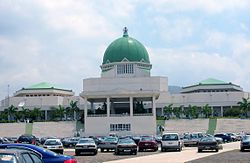Top Qs
Timeline
Chat
Perspective
House of Representatives (Nigeria)
Lower house of the Nigerian National Assembly From Wikipedia, the free encyclopedia
Remove ads
The House of Representatives (also called Green Chamber) is the lower chamber of Nigeria's bicameral National Assembly.[1] The Senate is the upper chamber.[2]
The Green Chamber has 360 members who are elected in single-member constituencies using the plurality (or first-past-the-post) system, most recently in 2023. Members serve four-year terms. The presiding officer of the house is the Speaker, currently Tajudden Abbas (as of May 2024).
Remove ads
State delegations
Summarize
Perspective
The Constitution of the Federal Republic of Nigeria, assumes a National Assembly for the federation which consists of a Senate and a House of Representatives. The Senate consists of three members from each Nigerian state and one member from the Federal Capital Territory, Abuja. The House of Representatives consists of 360 members, each representing a federal constituency.[3]
Remove ads
Current composition
Remove ads
Members (since 1979)
- Members
- List of members of the House of Representatives of Nigeria, 1979–1992
- List of members of the House of Representatives of Nigeria, 1992–1998
- List of members of the House of Representatives of Nigeria, 1998–1999
- List of members of the House of Representatives of Nigeria, 1999–2003
- List of members of the House of Representatives of Nigeria, 2003–2007
- List of members of the House of Representatives of Nigeria, 2007–2011
- List of members of the House of Representatives of Nigeria, 2011–2015
- List of members of the House of Representatives of Nigeria, 2015–2019
- List of members of the House of Representatives of Nigeria, 2019–2023
- List of members of the House of Representatives of Nigeria, 2023–2027
- Clerks
- List of the Clerks of the House of Representatives of Nigeria
Party leaders
Party leaders and Whips are elected by their respective parties in a closed-door caucus by secret ballot. With the APC holding a majority of seats and the PDP holding the highest minority, the current leaders in the 10th National Assembly are: Majority Leader Prof. Julius Ihonvbere From Edo State, Chief Whip Usman Bello Kumo from Gombe State, Abdullahi Ibrahim Halims from Kogi State as the Deputy Majority Leader, while Ogun Lawmaker, Oriyomi Onanuga emerged as the Deputy Chief Whip, and Minority Whip goes to Kingsley Chinda from Wike Camp and Deputy Minority Leader goes to two termed Member from Billiri, Gombe State, Ali Isa J.C.[4]
Remove ads
See also
References
Wikiwand - on
Seamless Wikipedia browsing. On steroids.
Remove ads





